For anyone who has traveled the world, the excessive automobile horn use in India will be an interesting subject of study. In developed countries, honking is almost non-existent, except to warn for emergencies. In contrast, much of the honking in India is habitual and unnecessary. Relentless horn use is a major source of noise pollution. More than a nuisance, it is a health hazard to everyone in the vicinity.
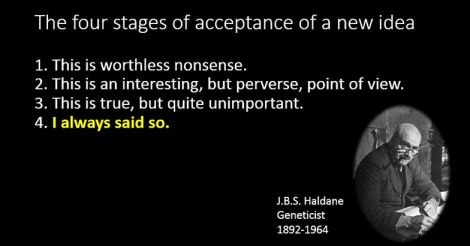 The four stages of acceptance of a new idea: Reducing unnecessary use of horn is one such idea. It will take time for universal acceptance in a country like India, where people are used to honking and getting honked at.
The four stages of acceptance of a new idea: Reducing unnecessary use of horn is one such idea. It will take time for universal acceptance in a country like India, where people are used to honking and getting honked at.The objective of this article is to analyze the problem of noise pollution from excessive horn use in India, and to suggest workable solutions.
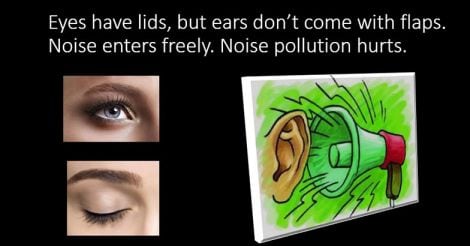 Our ears do not have built-in flaps. We don’t have a natural option to block out noise that we don’t want to hear. Noise is physical energy that can damage our body and mind. Noise pollution therefore needs to be actively curbed.
Our ears do not have built-in flaps. We don’t have a natural option to block out noise that we don’t want to hear. Noise is physical energy that can damage our body and mind. Noise pollution therefore needs to be actively curbed.Honking levels: India vs. the west.
While comparing India with the west, our first instinct would be to argue that countries like Germany and Canada have fewer people and better road conditions. However, honking patterns go beyond road congestion and infrastructure. For instance, countries such as China and Sri Lanka that have congested roads have surprisingly low honking levels - comparable to western nations.
Within India, certain areas like Mizoram have lower honking levels. Thanks to greater awareness, some cities like Kochi have relatively lower honking levels, particularly among resident private car users.
The heterogeneity among road users in India is a key factor – their civic sense, risk tolerance and educational status vary enormously. The number of traffic law enforcement personnel being inadequate, a few rogue road users are frequently seen destroying the order created and maintained by the vast majority of law-abiding citizens.
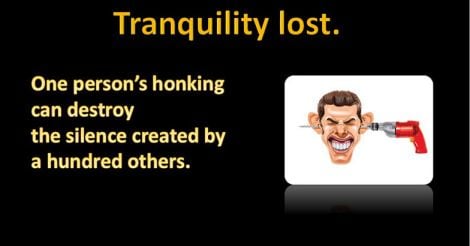
Also check:Everyday Health | Getting to know the Cholesterol family
While the reasons for honking are varied, it remains a fact that the amount of noise pollution from excessive horn use is on the rise in India, particularly in the metros. The problem is compounded by insufficient roads, rapidly rising automobile population and chaotic road conditions where impatient motorists compete for space with pedestrians, illegally parked vehicles and stray animals.
What are the types of honking behavior among drivers in India?
Much of the honking we hear on Indian roads falls into the following ten categories.
‘Habitual honkers’: They have been honking ever since they learned to drive. They start honking as soon as they get in and turn on the ignition, and stop when they get off.
‘Get out of my way!’ type: This applies to people who are permanently in a hurry on the road. The problem here is faulty time management as well as lack of respect for other road users. They fail to budget enough time for their travel, and blame the other road users for their being late. They expect others to make way for them each time they enter the road. Many private city buses and auto rickshaws fall into this category.
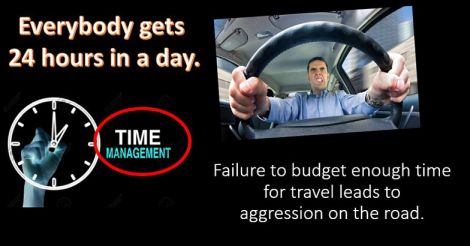 Faulty time management is the root cause of many accidents. Always running late, such people keep trying to make up lost time on the road. They engage in aggressive road behavior, including excessive honking.
Faulty time management is the root cause of many accidents. Always running late, such people keep trying to make up lost time on the road. They engage in aggressive road behavior, including excessive honking.‘Can’t you see I am a V.I.P?’ type. Although criticized by social thinkers, courts and the informed public, India has a thriving ‘VIP culture’, with more and more people calling themselves VIP’s. In addition to the beacon lights that some of them are provided with, these VIP’s commonly unleash noise pollution using high decibel horns.
However, from May 1 onwards, the Government of India had abolished the use of all beacon lights except for emergency services. Although a welcome step towards equality on the roads, whether this will reduce horn use remains to be seen.
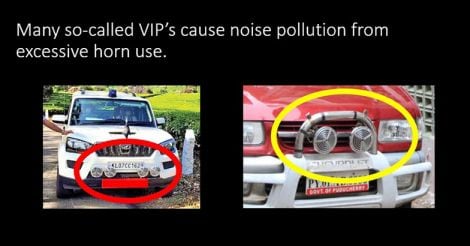
‘My horn is so powerful, it clears traffic blocks’ type: These people become active chiefly during traffic blocks that involve dozens of stopped vehicles with hardly an inch of space in between. By continuously honking in such conditions, they seem to hope that the noise will magically blow away all the vehicles, leaving an empty road ahead for their exclusive use.
‘The overtakers’: On an apparent mission to overtake every vehicle in front no matter how brief the commute, they compulsorily honk each time they pass a vehicle – contributing generously to the din.
‘The green signal maniacs’: A common phenomenon in metros, these people start honking as soon as the red signal turns green. They seem to assume that everyone else is asleep in their respective vehicles and it is their responsibility to wake them up.
‘I have entered the road’ type: These folks love to announce their arrival on the road with a loud blare of the horn. Getting noticed is partly the intention.
‘Don’t hit me’ type: They assume that all other road users are blind; and fear that unless they honk, others will collide with them. Possibly the effect of past generation driving instructors who trained them to honk at every living being they saw on the road.
‘I am angry at you’ type: These are the road rage people. Ill-tempered from birth, they are permanently angry at other road users for not behaving in ways that conform to their own beliefs and expectations.
‘Watch out!’ type: These people never use the horn unless they want to warn someone of impending danger. By the way, this is an example of appropriate use of horn.
Why do people honk in India? Congested road conditions and chaotic behavior of other road users cause people to overuse their horn. Many believe that honking is necessary to avoid accidents and to clear traffic blocks.
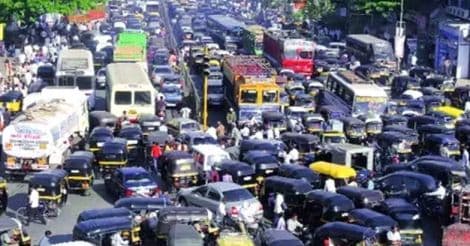 Why do people honk in India? Congested road conditions and chaotic behavior of other road users cause people to overuse their horn. Many believe that honking is necessary to avoid accidents and to clear traffic blocks.
Why do people honk in India? Congested road conditions and chaotic behavior of other road users cause people to overuse their horn. Many believe that honking is necessary to avoid accidents and to clear traffic blocks. What does honking mean to the listeners and why is it bad for their health?
Trying to interpret horn noise is somewhat like attempting to figure out why a dog is barking. It can be hard to say what’s in the dog’s mind as the barking noise remains almost the same - regardless of what the dog is thinking. By the same token, the noise created by excessive honking might have assorted explanations from the driver’s side. But in the end, noise is noise - and excess of it affects those helpless people who happen to be around at that time.
The suffering is worst for pedestrians and those traveling by two-wheelers, auto rickshaws and city buses – there is no barrier that protects them from these powerful blasts of sound. The case is no different for traffic police officers, roadside shopkeepers and those who live in houses and apartments nearby.
The noise created by the automobile horn is so loud, it is by no means a harmless gesture. At 10,00,000 times more powerful than human conversation, it can even be heard from miles away. Sound waves, a physical form of energy, can cause substantial damage to the body. The closer the person is to the source of noise - as in halted traffic, the greater the damage is.
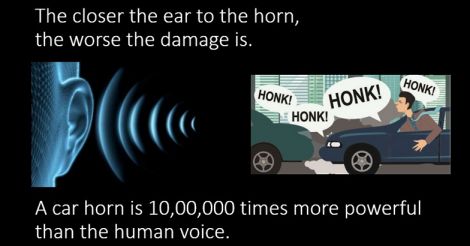 In addition to the decibel level, the damage to our ears also depends on how far away the sound source is. The closer it is, the worse the damage.
In addition to the decibel level, the damage to our ears also depends on how far away the sound source is. The closer it is, the worse the damage.The health effects of noise were explained in my recent article on noise pollution.
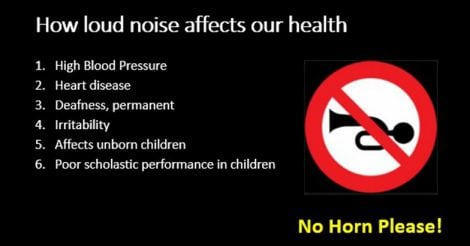
What is the effect of culture on honking? Is honking really seen as a problem in India?
For those who grew up in western countries, the loud ambient noise might come as an unpleasant surprise while visiting India. However, those who grew up in India do not seem to have much of a problem with it. Assorted noises including music blaring through loudspeakers, radio, TV, loud conversation, construction work, loud automobile engines and the seemingly incessant honking are all accepted as part of life by most local people.
Honking in India is generally not considered a personal insult – by the doer or the listener. It comes as a way of life for most road users. Hence, a person living in India might not be offended by honking, unlike a person who grew up in a place where it was considered rude to honk.
Do habitual honkers convert?
Fazil, a management professional and a self-confessed habitual horn abuser – was driving from Cochin to Chennai on a public holiday. His car’s horn stopped working halfway, but he could not spare the time to find a garage to get it repaired. He decided to complete the second half of the journey noiselessly: that was without honking.
To his pleasant surprise, he discovered that people still got out of his way, and he reached Chennai earlier than he expected. The best part was that he did not experience the usual aggravation. Fazil found that a few seconds of patience and courtesy for other road users gave him better results than irritating everyone with his car horn. From that day, he stopped unnecessary honking and is active with the Horn Not OK Please program by Young Indians.
Sometimes, in life, we learn things by accident. This was one such instance.
What is decibel?
Just as kilogram is a measure of weight, decibel is the measure of intensity of sound.
The typical range is 0-130. The sound of normal breathing is 10 decibels. A whisper is 30 dB, normal conversation is 60 dB, and quiet city traffic is 80 dB. Horns range from 80 -120 dB. The loudest noise, for example a jet engine will be 140 decibels.
Why is decibel a misleading measure of sound intensity?
Decibels can be a misleading measure of sound intensity. To illustrate this, let us compare a car horn and human voice using decibels. Most people would assume that a 120 decibel horn is only twice as powerful as human voice at 60 dB, just as a 10 kilogram bag is twice as heavy as a 5 kilogram bag.
But decibel being a logarithmic scale, the actual difference between 120 and 60 dB is a factor of 60, which means 106 or 1 million (10,000,00) times.
Likewise, the difference between 60 dB and 30 dB is a factor of 30, which means 103 or 1000 times.
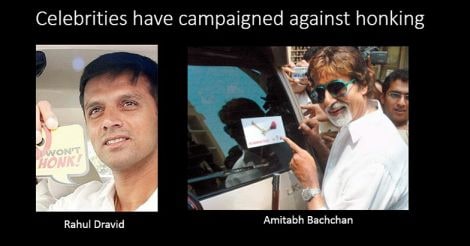 Mass appeal. Rahul Dravid and Amitabh Bachchan have campaigned against excessive honking, but the results are far from encouraging.
Mass appeal. Rahul Dravid and Amitabh Bachchan have campaigned against excessive honking, but the results are far from encouraging. What can we do from tomorrow?
1. Horn use can be reserved for use only for emergencies. If we sense danger ahead, it can be used as a warning. The old practice of using the horn just to announce our presence on the road or to showcase our impatience can be given a rest.
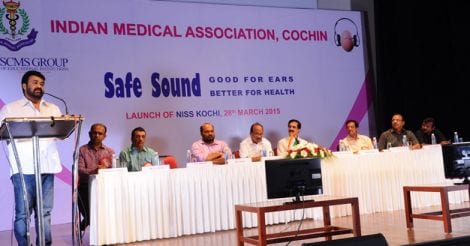 The Indian Medical Association has worked towards reducing noise pollution through its NISS (National initiative for safe sound). Film actor Mohanlal has endorsed the program.
The Indian Medical Association has worked towards reducing noise pollution through its NISS (National initiative for safe sound). Film actor Mohanlal has endorsed the program.2. Honking is a habit, it can be hard to break. No honking days are opportunities to try out such healthy experiments. Such discussions can be initiated at home, social forums, classrooms as well at places of work. As in Fazil’s case above, once people discover that habitual honking makes no difference to travel time, they will be better convinced.
No Horn Day: To create awareness about noise pollution, April 26 has since been declared No Horn Day by the Government of Kerala at the request of Indian Medical Association.
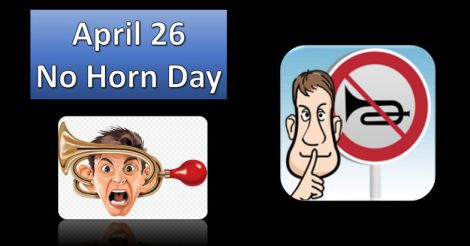
3. The notion “people won’t get out of our way if we don’t honk” is outdated and incorrect. Fifty years ago, with far fewer vehicles on the road, it was common culture in India to expect a warning honk from vehicles coming up behind. This is reflected in the “Sound Horn Please” sign, still visible on old trucks. This is the year 2017, and honking is not really required for routine commutes any more.
4. For overtaking on single lane roads in India, a short beep of the horn or a single flash of the headlight may be needed when the driver in front is driving absent-minded and blocking traffic.
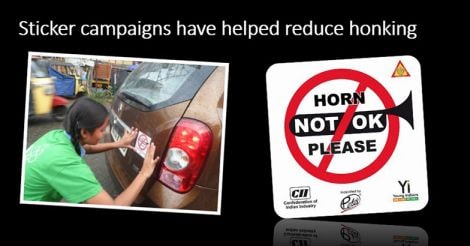
5. On rural roads with sharp blind curves, drivers of oncoming vehicles might expect to hear a horn from us while negotiating blind corners. At least some drivers on rural roads in India assume there is no oncoming vehicle if they don’t hear a horn. While it is not their fault to expect a warning honk, not obliging could sometimes result in a surprise. A zero-horn policy will not work in such instances; discretionary honking is more sensible.
6. High decibel horns may be replaced with low intensity horns. Air horns are already banned.
7. After dark, all horn use must be stopped, headlights can be used instead to warn others.
Hospitals, schools and places of worship are silent zones; horn use must be avoided near such establishments. Unfortunately, without effective law enforcement, this cannot become a reality - as even one person honking generates so much noise, it nullifies the good behavior of hundreds of others.
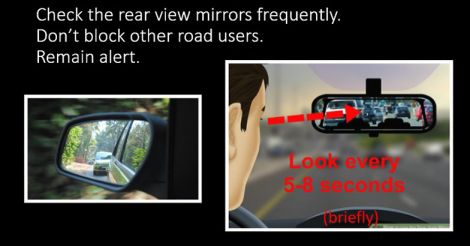 Check your mirrors. Inexperienced drivers tend to drive absent-minded and fail to pay attention to the road behind. They often block other road users, who end up honking out of frustration. Frequent glances at rear-view mirrors helps us remain aware of the rapidly changing conditions of the road behind.
Check your mirrors. Inexperienced drivers tend to drive absent-minded and fail to pay attention to the road behind. They often block other road users, who end up honking out of frustration. Frequent glances at rear-view mirrors helps us remain aware of the rapidly changing conditions of the road behind. In summary, excessive honking is an important cause of the worsening noise pollution in India. Old habits are hard to break, and active campaigning on several fronts will be required to reduce habitual and unnecessary horn use. With rare exceptions, horn is to be used only to warn other people of the possibility of an accident.
Further reading
The hazards of noise pollution and workable solutions.
The importance of checking the rear-view mirrors frequently
Ban by Supreme court on loud horns and illegal use of red beacons.
(The author is a senior consultant gastroenterologist and deputy medical director, Sunrise group of hospitals)


























